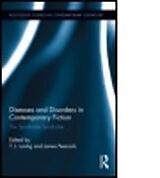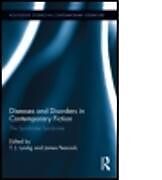Diseases and Disorders in Contemporary Fiction
Einband:
Fester Einband
EAN:
9780415507400
Untertitel:
The Syndrome Syndrome
Genre:
Medizin
Autor:
James Lustig, Tim Peacock
Herausgeber:
Taylor & Francis Ltd (Sales)
Anzahl Seiten:
216
Erscheinungsdatum:
27.03.2013
ISBN:
978-0-415-50740-0
Informationen zum Autor James Peacock is Lecturer in English and American Literature at Keele University, UK. T.J. Lustig is Senior Lecturer in American Literature at Keele University, UK. Klappentext The essays in this collection address the current preoccupation with neurological conditions and disorders in contemporary literature by British and American writers. The book places these fictional treatments within a broader cultural and historical context, exploring such topics as the two cultures debate, the neurological turn, postmodernism and the post-postmodern, and responses to September 11th. Considering a variety of materials including mainstream literary fiction, the graphic novel, popular fiction, autobiographical writing, film, and television, contributors consider the contemporary dimensions of the interface between the sciences and humanities, developing the debate about the post-postmodern as a new humanism or a return to realism and investigating questions of form and genre, and of literary continuities and discontinuities. Further, the essays discuss contemporary writers' attempts to engage the relation between the individual and the social, looking at the relation between the "syndrome syndrome" (referring to the prevalence in contemporary literature of neurological phenomena evident at the biological level) and existing work in the field of trauma studies (where explanations tend to have taken a psychoanalytical form), allowing for perspectives that question some of the assumptions that have marked both these fields. The current literary preoccupation with neurological conditions presents us with a new and distinctive form of trauma literature, one concerned less with psychoanalysis than with the physical and evolutionary status of human beings. Zusammenfassung The essays in this collection address the current preoccupation with neurological conditions and disorders in contemporary literature by British and American writers. The book places these fictional treatments within a broader cultural and historical context, exploring such topics as the two cultures debate, the neurological turn, postmodernism and the post-postmodern, and responses to September 11th. Considering a variety of materials including mainstream literary fiction, the graphic novel, popular fiction, autobiographical writing, film, and television, contributors consider the contemporary dimensions of the interface between the sciences and humanities, developing the debate about the post-postmodern as a new humanism or a return to realism and investigating questions of form and genre, and of literary continuities and discontinuities. Further, the essays discuss contemporary writers' attempts to engage the relation between the individual and the social, looking at the relation between the "syndrome syndrome" (referring to the prevalence in contemporary literature of neurological phenomena evident at the biological level) and existing work in the field of trauma studies (where explanations tend to have taken a psychoanalytical form), allowing for perspectives that question some of the assumptions that have marked both these fields. The current literary preoccupation with neurological conditions presents us with a new and distinctive form of trauma literature, one concerned less with psychoanalysis than with the physical and evolutionary status of human beings. Inhaltsverzeichnis Introduction, James Peacock and Tim Lustig 1. "Rational Dependent Animals": The "Syndrome Syndrome" in Recent Fiction, Patricia Waugh 2. Mapping the Post-Postmodern Syndrome Novel, Stephen J. Burn 3. From Syndrome to Sincerity: Benjamin Kunkel's Indecision , Adam Kelly 4. "We learned to tell our story walking" or, Tugging the Boat: Tourette's and Urban Space in Jonathan Lethem's Motherless Brooklyn , James Peacock 5. The Pathologies of Mobility: the Genetic/ Generic Disorders of Audrey Ni...
Klappentext
The essays in this collection address the current preoccupation with neurological conditions and disorders in contemporary literature by British and American writers. The book places these fictional treatments within a broader cultural and historical context, exploring such topics as the two cultures debate, the neurological turn, postmodernism and the post-postmodern, and responses to September 11th. Considering a variety of materials including mainstream literary fiction, the graphic novel, popular fiction, autobiographical writing, film, and television, contributors consider the contemporary dimensions of the interface between the sciences and humanities, developing the debate about the post-postmodern as a new humanism or a return to realism and investigating questions of form and genre, and of literary continuities and discontinuities. Further, the essays discuss contemporary writers' attempts to engage the relation between the individual and the social, looking at the relation between the "syndrome syndrome" (referring to the prevalence in contemporary literature of neurological phenomena evident at the biological level) and existing work in the field of trauma studies (where explanations tend to have taken a psychoanalytical form), allowing for perspectives that question some of the assumptions that have marked both these fields. The current literary preoccupation with neurological conditions presents us with a new and distinctive form of trauma literature, one concerned less with psychoanalysis than with the physical and evolutionary status of human beings.
Inhalt
Introduction, James Peacock and Tim Lustig 1. "Rational Dependent Animals": The "Syndrome Syndrome" in Recent Fiction, Patricia Waugh 2. Mapping the Post-Postmodern Syndrome Novel, Stephen J. Burn 3. From Syndrome to Sincerity: Benjamin Kunkel's Indecision, Adam Kelly 4. "We learned to tell our story walking" or, Tugging the Boat: Tourette's and Urban Space in Jonathan Lethem's Motherless Brooklyn, James Peacock 5. The Pathologies of Mobility: the Genetic/ Generic Disorders of Audrey Niffenegger's Time Machine, Brian Baker 6. Syndrome, Symptom and Trauma Chains in the Post-9/11 Novel, Bent Sørensen 7. Mind and Brain: The Representation of Trauma in Martin Amis's Yellow Dog and Ian McEwan's Saturday, Nick Bentley 8. Cartoon Symptomology: The Visible, the Readable and the Preventable, N.R. Lawrence 9. "Two-way traffic"? Syndrome as Symbol in Richard Powers' The Echo Maker, Tim Lustig 10. "I wanted unheimlich but of the right kind. Strangeness and strangerness without the blank despair": Trauma and Travel in the Works of Jenny Diski, Joanna Price Two Responses, Flora Vaccarino and Lisetta Lovett Annotated Bibliography I: Primary Materials, Nicola Brindley Annotated Bibliography II: Secondary Materials, Hannah Merry Keywords, Cat Burton-Cartledge

Leider konnten wir für diesen Artikel keine Preise ermitteln ...
billigbuch.ch sucht jetzt für Sie die besten Angebote ...
Die aktuellen Verkaufspreise von 6 Onlineshops werden in Realtime abgefragt.
Sie können das gewünschte Produkt anschliessend direkt beim Anbieter Ihrer Wahl bestellen.
Loading...
Die aktuellen Verkaufspreise von 6 Onlineshops werden in Realtime abgefragt.
Sie können das gewünschte Produkt anschliessend direkt beim Anbieter Ihrer Wahl bestellen.
| # | Onlineshop | Preis CHF | Versand CHF | Total CHF | ||
|---|---|---|---|---|---|---|
| 1 | Seller | 0.00 | 0.00 | 0.00 |
